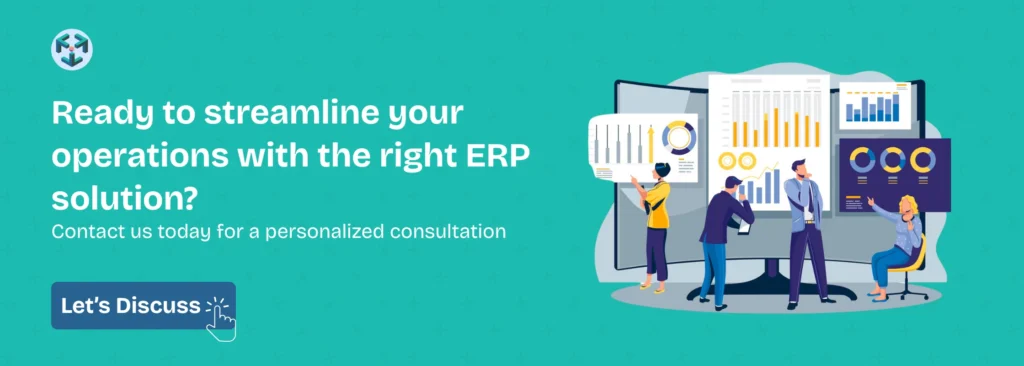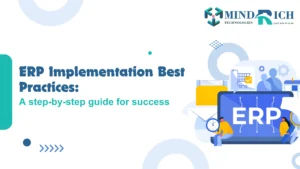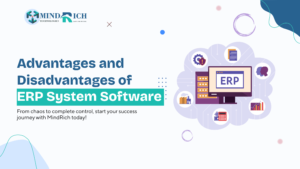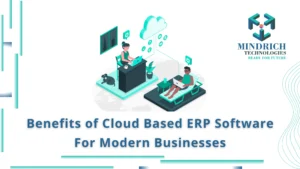In today’s fast-growing and advanced business world, handling different tasks like accounting, inventory, sales, HR, and customer service separately can be quite difficult. And this is exactly where an ERP software helps to solve these problems. But as ERP Software has benefits it has challenges as well. So, here we will look at the challenges of ERP Software & the benefits of ERP Software.
No matter whether your business is small or large, an ERP system can easily make your daily business tasks better and more organized. But just like it offers several benefits, it also has some challenges as well like high initial costs, the need for training for your team or just dealing with complex installation and maintenance.
In this blog, we’ll see the both sides of ERP software; on one side, its strong benefits and on the other, the common problems and challenges of ERP Software that businesses might face while using or adopting it.
What is ERP software?
ERP basically stands for Enterprise Resource Planning. It is a system that brings all the important business functions and modules into just one single platform. This helps create better coordination between departments, ensures that each task is completed on time and reduces errors to almost none.
ERP systems work by connecting various modules, each focus on a specific area. For example, finance modules handle accounting, while inventory modules manage stock levels. All modules share data through a common database, reduce repetition and errors. This helps real -time data flow businesses to make faster and better decisions.
You can deploy ERP software on clouds or as hybrid systems, providing flexibility for all sizes of businesses. The ERP market is growing rapidly. And experts expect global expenses to reach $147.7 billion in 2025, showing its importance in industries. Today’s ERP solutions often include advanced technologies such as AI and Analytics, which make them even more powerful for modern businesses.
Benefits of ERP Software
Now, when a business starts growing, managing everything manually becomes quite challenging. And that’s exactly where an ERP software steps in as a strong solution, bringing all tasks and operations into just one organized platform.
1. Centralized System – Everything in One Place
An ERP system connects all the major departments of your business like sales, finance, inventory management, HR and customer service only on a single platform. This means you don’t need to use multiple tools or separate software for your different business tasks. It reduces confusion, saves time and makes it so easier to manage everything from one place.
2. Increases Efficiency and Speed
Handling everyday business tasks manually takes a lot of time and increases the chances of errors. But an ERP system automates all these processes, like sales, billing, stock updates, order tracking and HR activities, so that everything runs faster and more smoothly.
3. Real-Time and Accurate Data Information
ERP software always provides updated, real-time data of your business. Whether you need to track your sales targets, check pending orders or just monitor stock levels, you can get accurate figures instantly. This helps you to make smart decisions without the risk of acting on outdated or wrong information.
4. Reduces Errors and Mistakes
Since everything is centralized in just one software and a lot of tasks are automatic, the chances of manual errors or duplicate entries are totally reduced. That boosts the accuracy of your business data and saves you from having to fix repeated mistakes.
5. Cost-Effective & Budget-Friendly
An ERP system can feel expensive at the beginning on your pocket. But in the long run, it actually saves money by reducing extra workload, minimizing errors and improving team productivity. Eventually you’ll end up cutting down on losses and unnecessary costs.
6. Better Coordination Between Teams
With a suitable ERP, different teams can easily access the same data in real time. This improves communication, avoids delays, and helps every department stay in sync. It builds stronger coordination between employees and ensures smoother workflow across your entire business.
7. Helps in Business Growth and Expansion
As your business grows further, you need a system that can also scale with you. ERP software is flexible—you can add new users, tools or features whenever needed in it. That will make it a perfect fit for supporting long-term business expansion.
8. Better Data Security
Modern ERP systems come with strong robust security features. Only authorized users can have access or change important data. This lowers the risk of data leaks or misuse. And even in cloud-based ERP systems, your data is encrypted, so that your business info remains safe and protected at all times.
9. Improved Customer Service
ERP gives your sales team fast and easy access to check customer details, order histories and product information. This means they can respond more quickly to them and serve your customers better, which leads to a stronger customer experience overall.
Also Read: Benefits Of Cloud Based ERP Software For Businesses
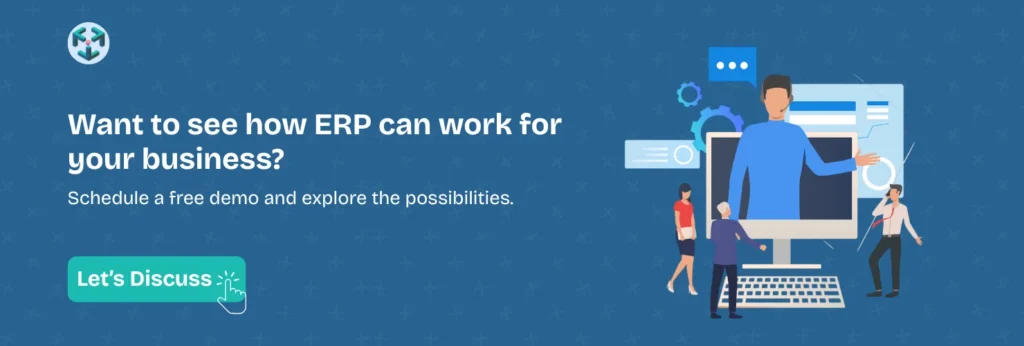
Challenges of ERP Software
While an ERP software can make business operations more efficient and easier. It also comes with some major challenges that can’t be ignored. From high setup costs to technical difficulties, adopting an ERP system is not always a smooth ride for every business. Let’s take a look at some common challenges that businesses often face while installing ERP software.
1. High Initial Cost
One of the biggest obstacles is the high upfront cost. Buying a suitable ERP system, setting it up and maintaining it can be expensive especially for small businesses which are already working with their tight budgets.
2. Complicated Implementation Process
Setting up an ERP system isn’t a one day task. In several cases, the implementation can take some weeks or even months, depending upon the business size and complexity of operations. During this time some internal systems often slow down or face downtime, making the transition difficult and time-consuming.
3. Training & Change Management
Since ERP systems are new for most of the employees, proper training is necessary so that everyone can use the system appropriately. Also, some people avoid switching to new systems which leads to frustration and hesitation during the adoption phase.
4. Regular Maintenance & Updates
Even after the ERP is successfully set up and running, it still requires regular maintenance, updates and security checks. But if this is not planned well then it can interfere with daily business operations or cause unexpected disturbance.
5. Vendor Dependency
Businesses often become dependent on their ERP vendor usually for everything from support and upgrades to customizations and any technical fixes. If the vendor’s service is slow or weak, it can delay business operations and damage productivity.
6. Integration Challenges
Sometimes the ERP system may not integrate smoothly with the existing third party tools like current CRM or payroll system. This can create consistency issues and force you to handle some daily tasks manually again, totally defeating the purpose of automation.
How to Balance Challenges with Benefits
As we all know, just like every good thing comes with few drawbacks, the same thing applies to ERP software as well. While an ERP system offers strong benefits like time-saving, automation and better coordination, it also comes up along with certain challenges such as high costs, technical issues and the need for proper training and support.
The best and right way to balance these is by giving equal importance to both the advantages and the challenges. Never make your decision just by looking at the positives of it. Also, always ask yourself if you’re actually prepared to deal with the difficulties that come with it. Choosing the right ERP system based on your business size, team capacity and budget can certainly make a big difference. Also, if you provide your team with proper training and stay in regular contact with your vendor’s support team, many of these daily issues can be handled smoothly.
At the end of the day, if you’re approaching an ERP implementation with some major planning and the right mindset, the benefits will always outweigh the challenges and your business will gain far more benefits than the risks.
Curious about Why SMEs choose open source ERP software?
Final Thoughts
In today’s fast paced business world, having the right business tools to manage operations is not just an option but it’s a major necessity. An ERP software provides a complete solution that helps to keep your business organized, improves its overall efficiency, reduces errors and supports smart decision-making. Of course, some challenges exist too like the initial cost, the need for training or some possible technical issues. But as we discussed, if you put proper planning in place, choose a good and genuine vendor, and prepare your team well, then you can handle all of these problems fluently.
Whether you’re running a small startup or a large established company, an ERP system can become a long-term asset for your business. What matters most is to understand your business needs carefully, doing proper practical planning and keeping your team fully involved throughout the whole process. Because when the ERP is implemented the right way, it not only supports your operations but it actually helps your business grow further.
